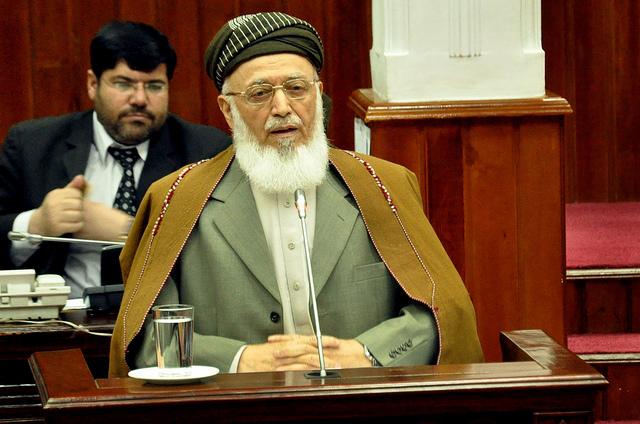KABUL, the panel’s chief told Parliament on Saturday.
Prof. Burhanuddin Rabbani, who along with other members of the peace body, was summoned to the lower house, informed lawmakers that the groups had evinced an interest in joining the peace process.
Briefing legislators on the council’s performance over the past four months, he said negotiations had been held with Taliban and Haqqani group representatives in and outside Afghanistan.
The peace council members had met with members of the Quetta Shura in Abu Dhabi, the United Arab Emirates, some time ago, he said, but did not name the Taliban representatives.
The ex-president added the Taliban, fearing they might be arrested, killed or sent to Guantanamo Bay, had set conditions for shunning the insurgency.
Rabbani said the Taliban, including their supreme leader Mullah Mohammad Omar, were ready to lay down arms before foreign troops launched operations, forcing them to flee the country.
Biradar, Abdul Razzaq, Obaidullah, Dadullah and several others Taliban leaders were killed after they agreed to join the reconciliation drive, Rabbani quoted the Quetta Shura representatives as saying.
Biradar was killed two years ago in Pakistan‘s Sindh province after he agreed to enter a dialogue with the Afghan government.
“I have promised them (Taliban) they would suffer no financial or life losses if they agree to recognise the Afghan constitution,” Rabbani said, adding Hezb-i-Islami and Haqqani network had also indicated their willingness for parleys.
Although the Taliban have not yet commented on Rabbani’s remarks, their key condition for renouncing violence is the withdrawal of foreign troops from Afghanistan.
Rabbani said the council had no proper building for its office for two months after its creation. The body embarked on its work five months ago, he said, calling the period short and its achievements considerable.
He claimed winning the support of neighbouring countries and the international community for the peace effort. However, he said the Taliban were not the only problem; interference of foreign spy agencies and drug smugglers also had a role in fueling the insurgency.
Neighbours had been asked to prevent their intelligence networks from interfering in Afghanistan’s internal affairs, he said, regretting no practical step had so far been taken in this regard.
The US and Norway wanted to enter direct talks with the rebels, but later they realised the process should be Afghan-led, he explained.
Some Afghan, Russian and Indian officials had expressed their concerns about the peace talks with the rebels. “But I assure them that the Taliban will live a normal life after renouncing violence,” Rabbani said.
Dr. Abdullah Abdulalh, President Hamid Karzai’s main political foe and the head of the Coalition for Hope and Change, is one of the principal Afghans leaders opposed to the initiative.
Mohammad Masoom Stanikzai, the council secretariat head, said out of the $141 million pledged by the international community for the reconciliation campaign, $133 million had been received so far.
Stanikzai dismissed allegations that the Afghan government had released political prisoners. He said only inmates held on dubious charges were freed after investigation into their cases.
Speaker Abdul Rauf Ibrahimi said the house was satisfied with the council’s performance and they had no questions to ask of its leaders.
ma/mud
Visits: 3









GET IN TOUCH
NEWSLETTER
SUGGEST A STORY
PAJHWOK MOBILE APP